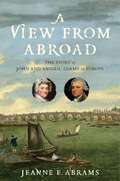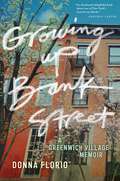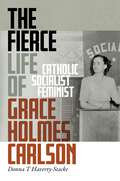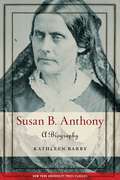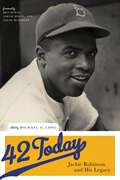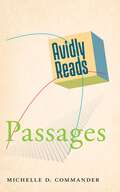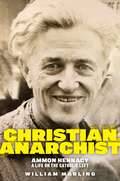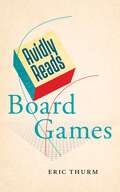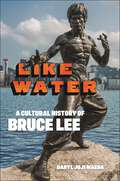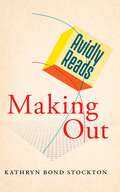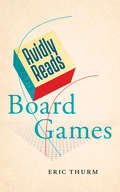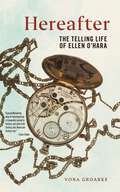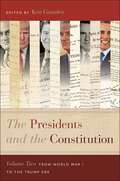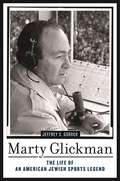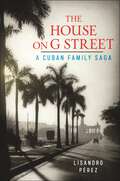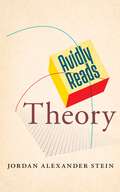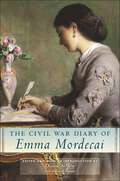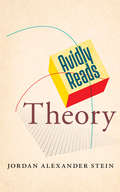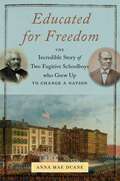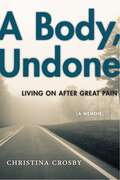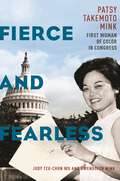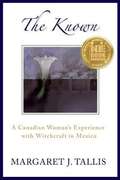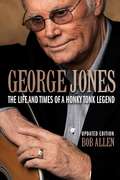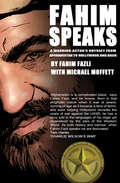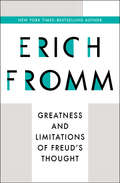- Table View
- List View
A View from Abroad: The Story of John and Abigail Adams in Europe
by Jeanne E. AbramsReveals how the European travels of John and Abigail Adams helped define what it meant to be an AmericanFrom 1778 to 1788, the Founding Father and later President John Adams lived in Europe as a diplomat. Joined by his wife, Abigail, in 1784, the two shared rich encounters with famous heads of the European royal courts, including the ill-fated King Louis XVI and Queen Marie-Antoinette, and the staid British Monarchs King George III and Queen Charlotte. In this engaging narrative, A View from Abroad takes us on the first full exploration of the Adams’s lives abroad. Jeanne E. Abrams reveals how the journeys of John and Abigail Adams not only changed the course of their intellectual, political, and cultural development—transforming the couple from provincials to sophisticated world travelers—but most importantly served to strengthen their loyalty to America.Abrams shines a new light on how the Adamses and their American contemporaries set about supplanting their British origins with a new American identity. They and their fellow Americans grappled with how to reorder their society as the new nation took its place in the international transatlantic world. After just a short time abroad, Abigail maintained that, “My Heart and Soul is more American than ever. We are a family by ourselves.” The Adamses’ quest to define what it means to be an American, and the answers they discovered in their time abroad, still resonate with us to this day.
Growing Up Bank Street: A Greenwich Village Memoir (Washington Mews Books)
by Donna FlorioA vivid memoir of life in one of New York City’s most dynamic neighborhoodsGrowing Up Bank Street is an evocative, tender account of life in Greenwich Village, on a unique street that offered warmth, support, and inspiration to an adventurous and openhearted young girl. Bank Street, a short strip of elegant brownstones and humble tenements in Greenwich Village, can trace its lineage back to the yellow fever epidemics of colonial New York. In the middle of the last century, it became home to a cast of extraordinary characters whose stories intertwine in this spirited narrative. Growing up, Donna Florio had flamboyant, opera performer parents and even more free-spirited neighbors. As a child, she lived among beatniks, artists, rock musicians, social visionaries, movie stars, and gritty blue-collar workers, who imparted to her their irrepressibly eccentric life rules. The real-life Auntie Mame taught her that she is a divine flame from the universe. John Lennon, who lived down the street, was gracious when she dumped water on his head. Sex Pistols star Sid Vicious lived in the apartment next door, and his heroin overdose death came as a wake-up call during her wild twenties. An elderly Broadway dancer led by brave example as Donna helped him comfort dying Villagers in the terrifying early days of AIDS, and a reclusive writer gave her a path back from the brink when, as a witness to the attacks of 9/11, her world collapsed. These vibrant vignettes weave together a colorful coming of age tale against the backdrop of a historic, iconoclastic street whose residents have been at the heart of the American story. As Greenwich Village gentrifies and the hallmarks of its colorful past disappear, Growing Up Bank Street gives the reader a captivating glimpse of the thriving culture that once filled its storied streets.
The Fierce Life of Grace Holmes Carlson: Catholic, Socialist, Feminist
by Donna T. Haverty-StackeShares the story of the revolutionary Marxist and Catholic Grace Holmes Carlson and her life-long dedication to challenging social and economic inequalityOn December 8, 1941, Grace Holmes Carlson, the only female defendant among eighteen Trotskyists convicted under the Smith Act, was sentenced to sixteen months in federal prison for advocating the violent overthrow of the government. After serving a year in Alderson prison, Carlson returned to her work as an organizer for the Socialist Workers Party (SWP) and ran for vice president of the United States under its banner in 1948. Then, in 1952, she abruptly left the SWP and returned to the Catholic Church. With the support of the Sisters of St. Joseph, who had educated her as a child, Carlson began a new life as a professor of psychology at St. Mary’s Junior College in Minneapolis where she advocated for social justice, now as a Catholic Marxist.The Fierce Life of Grace Holmes Carlson: Catholic, Socialist, Feminist is a historical biography that examines the story of this complicated woman in the context of her times with a specific focus on her experiences as a member of the working class, as a Catholic, and as a woman. Her story illuminates the workings of class identity within the context of various influences over the course of a lifespan. It contributes to recent historical scholarship exploring the importance of faith in workers’ lives and politics. And it uncovers both the possibilities and limitations for working-class and revolutionary Marxist women in the period between the first and second wave feminist movements. The long arc of Carlson’s life (1906–1992) ultimately reveals significant continuities in her political consciousness that transcended the shifts in her particular partisan commitments, most notably her life-long dedication to challenging the root causes of social and economic inequality. In that struggle, Carlson ultimately proved herself to be a truly fierce woman.
Susan B. Anthony: A Biography
by Kathleen BarryBrings to life one of the most significant figures in the crusade for women's rights in AmericaThis comprehensive biography of Susan B. Anthony traces the life of a feminist icon, bringing new depth to our understanding of her influence on the course of women’s history. Beginning with her humble Quaker childhood in rural Massachusetts, taking readers through her late twenties when she left a secure teaching position to pursue activism, and ultimately tracing her evolution into a champion of women’s rights, this book offers an in-depth look at the ways Anthony’s life experiences shaped who she would become. Drawing on countless letters, diaries, and other documents, Kathleen Barry offers new interpretations of Anthony’s relationship with feminist Elizabeth Cady Stanton, and illuminating insights on Anthony’s views of men, marriage, and children. She paints a vivid picture of the political, economic, and cultural milieu of 19th-century America. And, above all, she brings a very real Susan B. Anthony to life. Here we find a powerful portrait of this most singular woman—who she was, what she felt, and how she thought.Complete with a new preface to honor the 100th anniversary of women’s suffrage and Anthony’s vital role in the fight for voting rights, this thorough biography gives us essential new insight into the life and legacy of an enduring American heroine.
42 Today: Jackie Robinson and His Legacy (Washington Mews Books)
by Ken Burns Sarah Burns David McMahon MichaeL G Long&“Essays on the baseball great&’s impact on American society . . . A successful attempt to give a towering cultural figure his due beyond the baselines.&” —Kirkus Reviews (starred review) Before the United States Supreme Court ruled against segregation in public schools, and before Rosa Parks refused to surrender her bus seat in Montgomery, Alabama, Jackie Robinson walked onto the diamond on April 15, 1947, as first baseman for the Brooklyn Dodgers, making history as the first African American to integrate Major League Baseball in the twentieth century. Today a national icon, Robinson was a complicated man who navigated an even more complicated world that both celebrated and despised him. Many are familiar with Robinson as a baseball hero. Few, however, know of the inner turmoil that came with his historic status. Featuring piercing essays from a range of distinguished sportswriters, cultural critics, and scholars, this book explores Robinson&’s perspectives and legacies on civil rights, sports, faith, youth, and nonviolence, while providing rare glimpses into the struggles and strength of one of the nation&’s most athletically gifted and politically significant citizens. Featuring a foreword by celebrated directors and producers Ken Burns, Sarah Burns, and David McMahon, this volume recasts Jackie Robinson&’s legacy and establishes how he set a precedent for future civil rights activism, from Black Lives Matter to Colin Kaepernick. &“This collection of essays explores baseball legend Jackie Robinson&’s complicated legacy, his impact on society and the inner turmoil that came with his historic achievements.&” —USA Today &“Even those who know nothing about Robinson will take something inspiring away from this excellent anthology.&” —Publishers Weekly
Avidly Reads Passages (Avidly Reads Ser.)
by Michelle D. Commander"What is the value of Black life in America?"In Avidly Reads Passages, Michelle D. Commander plies four freighted modes of travel—the slave ship, train, automobile, and bus—to map the mobility of her ancestors over the past five centuries. In the process, she refreshes the conventional American travel narrative by telling an urgent story about how history shapes what moves us, as well as what prevents so many Black Americans from moving or being moved. Anchored in her maternal kin’s long history on and alongside plantations in rural South Carolina, Commander explores her family members’ ability and inability to navigate safely through space, time, and emotion, detailing how Black lives were shaped by the actual vehicles that promised an escape from the confines of American racism, yet nearly always failed to deliver on those promises. Using personal and public archives, Avidly Reads Passages unfolds distinct histories of transatlantic slavery ships, the possibilities presented by rail lines in the Reconstruction South, the fateful legacies of school busing, and the ways that Black Americans attempted to negotiate their automobility, including through the use of road and travel compendiums such as Travelguide and The Negro Motorist Green Book. In order to understand the intricacies of slavery and its aftermath, Commander began her exploration with the hope of engaging with the difficult evidences and stubborn gaps in her family’s genealogy; what she produced is a biting and elegiac reflection on working-class life in the Black South. Commander demonstrates that the forms of intimidation, brutality, surveillance, and restriction used to control Black mobility have merely evolved since slavery, marking Black life writ large in America, with neither the passage of time nor the passage of laws assuring true and adequate racial progress. Despite this bleak observation, Commander catalogs and celebrates, through affecting stories about her beloved South Carolina community, the compelling strivings of Southern Black people to survive by holding on firmly to family, and their faith that new worlds could be imagined, created, and traveled to someday.Part of the Avidly Reads series, this slim book gives us a new way of looking at American culture. With the singular blend of personal reflection and cultural criticism featured in the series, Avidly Reads Passages offers a unique lens through which to capture the intricacies of Black life.
Christian Anarchist: Ammon Hennacy, A Life on the Catholic Left
by William MarlingA biography of a remarkable figure, whose politics prefigured today’s social justice, ecology, and gender equality movements Ammon Hennacy was arrested over thirty times for opposing US entry in World War 1. Later, when he refused to pay taxes that support war, he lost his wife and daughters, and then his job. For protesting the bombing of Hiroshima and Nagasaki, he was hounded by the IRS and driven to migrant labor in the fields of the West. He had a romance with Dorothy Day, founder of the Catholic Worker, who called him a “prophet and a peasant.” He helped the homeless on the Bowery, founded the Joe Hill House of Hospitality in Salt Lake City, and protested the US development of nuclear missiles, becoming in the process one of the most celebrated anarchists of the twentieth century. To our era, when so much “protest” happens on social media, his actual sacrifices seem unworldly. Ammon Hennacy was a forerunner of contemporary progressive thought, and he remains a beacon for challenges that confront the world and especially the US today. In this exceptional biography, William Marling tells the story of this fascinating figure, who remains particularly important for the Catholic Left. In addition to establishing Hennacy as an exemplar of vegetarianism, ecology, and pacificism, Marling illuminates a broader history of political ideas now largely lost: the late nineteenth-century utopian movements, the grassroots socialist movements before World War I, and the antinuclear protests of the 1960s. A nuanced study of when religion and anarchist theory overlap, Christian Anarchist shows how Hennacy’s life at the heart of radical libertarian and anarchist interventions in American politics not only galvanized the public then, but offers us new insight for today.
Avidly Reads Board Games
by Eric Thurm“How we should think about board games, and what do they do to us as we play them?”Writer and critic Eric Thurm digs deep into his own experience as a board game enthusiast to explore the emotional and social rules that games create and reveal, telling a series of stories about a pastime that is also about relationships. From the outdated gender roles in Life and Mystery Date to the cutthroat, capitalist priorities of Monopoly and its socialist counterpart, Class Struggle, Thurm thinks through his ongoing rivalries with his siblings and ponders the ways games both upset and enforce hierarchies and relationships—from the familial to the geopolitical. Like sitting down at the table for family game night, Board Games is an engaging book of twists and turns, trivia, and nostalgia.Avidly Reads is a series of short books about how culture makes us feel. Founded in 2012 by Sarah Blackwood and Sarah Mesle, Avidly—an online magazine supported by the Los Angeles Review of Books—specializes in short-form critical essays devoted to thinking and feeling. Avidly Reads is an exciting new series featuring books that are part memoir, part cultural criticism, each bringing to life the author’s emotional relationship to a cultural artifact or experience. Avidly Reads invites us to explore the surprising pleasures and obstacles of everyday life.
Like Water: A Cultural History of Bruce Lee
by Daryl Joji MaedaHighlights Bruce Lee’s influence beyond martial arts and filmAn Asian and Asian American icon of unimaginable stature and influence, Bruce Lee revolutionized the martial arts by combining influences drawn from around the world. Uncommonly determined, physically gifted, and artistically brilliant, Lee rose to fame as part of a wave of transpacific globalization that bridged the nearly seven thousand miles between Hong Kong and California. Like Water unpacks Lee’s global impact, linking his legendary status as a martial artist, actor, and director to his continual traversals across the newly interconnected Asia and America.Daryl Joji Maeda’s multifaceted account of Bruce Lee’s legacy uniquely traces how movements and migrations across the Pacific Ocean structured the cultures Bruce Lee inherited, the milieu he occupied, the martial art he developed, the films he made, and the world he left behind. A unique blend of cultural history and biography, Like Water unearths the cultural strands that Lee intertwined in his rise to a new kind of global stardom. Moving from the gold rush in California and the British occupation of Hong Kong, to the Cold War and the deployment of American troops across Asia, Maeda builds depth and complexity to this larger-than-life figure. His cultural chronology of Bruce Lee reveals Lee to be both a product of his time and a harbinger of a more connected future. Nearly half a century after his tragic death, Bruce Lee remains an inspiring symbol of innovation and determination, with an enduring legacy as the first Asian American global superstar.
Avidly Reads Making Out
by Kathryn Bond Stockton“Here’s the thing with kissing: it matters intensely or not at all.”Mid-kiss, do you ever wonder who you are, who you’re kissing, where it’s leading? It can feel luscious, libidinal, friendly, but are we trying to make out something through our kissing? For Kathryn Bond Stockton, making out is a prism through which to look at the cultural and political forces of our world: race, economics, childhood, books, and movies. Making Out is Stockton’s memoir about a non-binary childhood before that idea existed in her world. We think about kissing as we accompany Stockton to the bedroom, to the closet, to the playground, to the movies, and to solitary moments with a book, the ultimate source of pleasure.Avidly Reads is a series of short books about how culture makes us feel. Founded in 2012 by Sarah Blackwood and Sarah Mesle, Avidly—an online magazine supported by the Los Angeles Review of Books—specializes in short-form critical essays devoted to thinking and feeling. Avidly Reads is an exciting new series featuring books that are part memoir, part cultural criticism, each bringing to life the author’s emotional relationship to a cultural artifact or experience. Avidly Reads invites us to explore the surprising pleasures and obstacles of everyday life.
Avidly Reads Board Games
by Eric ThurmAvidly Reads is a series of short books about how culture makes us feel. Founded in 2012 by Sarah Blackwood and Sarah Mesle, Avidly—an online magazine supported by the Los Angeles Review of Books—specializes in short-form critical essays devoted to thinking and feeling. Avidly Reads is an exciting new series featuring books that are part memoir, part cultural criticism, each bringing to life the author’s emotional relationship to a cultural artifact or experience. Avidly Reads invites us to explore the surprising pleasures and obstacles of everyday life. Writer and critic Eric Thurm digs deep into his own experience as a board game enthusiast to explore the emotional and social rules that games create and reveal, telling a series of stories about a pastime that is also about relationships. From the outdated gender roles in Life and Mystery Date to the cutthroat, capitalist priorities of Monopoly and its socialist counterpart, Class Struggle, Thurm thinks through his ongoing rivalries with his siblings and ponders the ways games both upset and enforce hierarchies and relationships—from the familial to the geopolitical. Like sitting down at the table for family game night, Board Games is an engaging book of twists and turns, trivia, and nostalgia.
Hereafter: The Telling Life of Ellen O'Hara (The Glucksman Irish Diaspora Series #6)
by Vona GroarkeWinner of the 2024 Michel Déon Prize for Non-FictionA lyrical portrait of a young Irish woman reinventing herself at the turn of the twentieth century in AmericaEllen O’Hara was a young immigrant from Ireland at the end of the nineteenth century who, with courage and resilience, made a life for herself in New York while financially supporting those at home. Hereafter is her story, told by Vona Groarke, her descendant, in a beautiful blend of poetry, prose, and history. In July 1882, Ellen O’Hara stepped off a ship from the West of Ireland to begin a new life in New York. What she encountered was a world of casual racial prejudice that characterized her as ignorant, dirty, and feckless, the butt of many jokes. From the slim range of jobs available to her she, like, many of her kind, found a position as a domestic servant, working long hours and living in to save on rent and keep. After an unfortunate marriage, Ellen determined to win financial security on her own, and eventually opened a boarding house where her two children were able to rejoin her. Vona Groarke builds this story from historical fact, drawing from various archives for evidence of Ellen. However, she also considers why lives such as Ellen’s seem to leave such a light trace in such records and fills in the gaps with memory and empathetic projection. Ellen—scrappy, skeptical, and straight-talking—is the heroine of Hereafter, whose resilience animates the story and whose voice shines through with vivid clarity. Hereafter is both a compelling account of an incredible figure and a reflection on how one woman’s story can speak for more than one life.
The Presidents and the Constitution, Volume Two: From World War I to the Trump Era
by Ken GormleyA revealing look at the constitutional issues that confronted and shaped each presidency from Woodrow Wilson through Donald J. TrumpDrawing from the monumental publication The Presidents and the Constitution: A Living History in 2016, the nation’s foremost experts in the American presidency and the US Constitution tell the intertwined stories of how the last eighteen American presidents have interfaced with the Constitution and thus defined the most powerful office in human history.This volume leads off with Woodrow Wilson, the president who led the nation through World War I, and ends with Donald J. Trump, who ushered the US into uncharted political and legal territory. In between, the country was confronted with international wars, the civil rights movement, 9/11, and the advent of the internet, all of which presented unique and pressing constitutional issues. The last one hundred years reveals the awesome powers of the American presidency in domestic and foreign affairs, illustrating how they have stood up to modern and novel legal challenges. The Presidents and the Constitution is for anyone interested in a captivating and illuminating account of one of the most compelling subjects in our American democracy.
Marty Glickman: The Life of an American Jewish Sports Legend
by Jeffrey S. Gurock2024 TAFWA Book Award WinnerThe first comprehensive biography of the preeminent voice of New York sportsFor close to half a century after World War II, Marty Glickman was the voice of New York sports. His distinctive style of broadcasting, on television and especially on the radio, garnered for him legions of fans who would not miss his play-by-play accounts. From the 1940s through the 1990s, he was as iconic a sports figure in town as the Yankees’ Mickey Mantle, the Knicks’ Walt Frazier, or the Jets’ Joe Namath. His vocabulary and method of broadcasting left an indelible mark on the industry, and many of today’s most famous sportscasters were Glickman disciples. To this very day, many fans who grew up listening to his coverage of Knicks basketball and Giants football games, among the myriad of events that Glickman covered, recall fondly, and can still recite, his descriptions of actions in arenas and stadiums. In Marty Glickman, Jeffrey S. Gurock showcases the life of this important contributor to American popular culture. In addition to the stories of how he became a master of American sports airwaves, Marty Glickman has also been remembered as a Jewish athlete who, a decade before he sat in front of a microphone, was cynically barred from running in a signature track event in the 1936 Olympics by anti-Semitic American Olympic officials. This lively biography details this traumatic event and explores not only how he coped for decades with that painful rejection but also examines how he dealt with other anti-Semitic and cultural obstacles that threatened to stymie his career. Glickman’s story underscores the complexities that faced his generation of American Jews as these children of immigrants emerged from their ethnic cocoons and strove to succeed in America amid challenges to their professional and social advancement. Marty Glickman is a story of adversity and triumph, of sports and minority group struggles, told within the context of the prejudicial barriers that were common to thousands, if not millions, of fellow Jews of his generation as they aimed to make it in America.
The House on G Street: A Cuban Family Saga
by Lisandro PérezThe unforgettable story of a family swept into history by the Cuban RevolutionIn The House on G Street, award-winning author Lisandro Pérez tells Cuba’s story through the lens of a single family: his own. His book relays the tales of two officers who fought against the Spanish for Cuban independence; a plantation owner who smuggles himself onto a ship; families divided by political loyalties; an orphaned boy from central Cuba who would go on to amass a fortune; a fatal love triangle; violence; and the ever-growing presence of the United States. It all culminates with an unforgettable portrait of a childhood spent in a world that was giving way to another one. The House on G Street is a unique depiction of one of the most consequential events of the twentieth century, told through generations of ancestors whose lives were shaped by dramatic historical forces.Pérez disentangles the complex history by following his family’s thread, imbuing political events with personal meaning. Their story begins with emigration to Cuba and follows the waning years of the colony. The end of Spanish rule gives way to pervasive American influence, and Perez’s family turned to New York as they adapted to the realities of a new republic with compromised sovereignty: privileged educations in boarding schools in Long Island and the Hudson Valley; a family business that took tobacco leaves from the soil of central Cuba to the docks of the East River; and grandparents who met and fell in love one night in the Upper West Side of Manhattan. His family learned to navigate the uneasy relationship between the United States and Cuba, a relationship that was destined to end in dramatic fashion. More than sixty years later, the Cuban Revolution resists receding into the past, sparking continued discussion, debate, and reinterpretation. There is a great deal that is known about the broad historical conditions that inexorably pushed Cuba towards revolution, but much less is known about the people who lived that dramatic history. It is a story that, if not recovered and told, will be lost, for Pérez’s ancestors lived in a world that no longer exists, swept away by a tide of revolutionary change. The House on G Street follows a family whose lives mirror the history of a nation. The result is a compelling blend of memoir and in-depth historical research, a remarkable new view of the path to revolution as seen from the first person.
Avidly Reads Theory
by Jordan Alexander Stein“Theory offered us a way of understanding the world that, like so many youthful exuberances, was both vital and ridiculous.”As an avowed “theory head,” Jordan Alexander Stein confronts a contradiction: that the abstract, and often frustrating rigors of theory also produced a sense of pride and identity for him and his friends: an idea of how to be and a way to live. Although Stein explains what theory is, this is not an introduction or a how-to. Organized around five ways that theory makes us feel—silly, stupid, sexy, seething and stuck—Stein travels back to the late nineties to tell a story of coming of age at a particular moment and to measure how that moment lives on now.Avidly Reads is a series of short books about how culture makes us feel. Founded in 2012 by Sarah Blackwood and Sarah Mesle, Avidly—an online magazine supported by the Los Angeles Review of Books—specializes in short-form critical essays devoted to thinking and feeling. Avidly Reads is an exciting new series featuring books that are part memoir, part cultural criticism, each bringing to life the author’s emotional relationship to a cultural artifact or experience. Avidly Reads invites us to explore the surprising pleasures and obstacles of everyday life. This is a story about the emotional lives of ideas.
The Civil War Diary of Emma Mordecai (Goldstein-Goren Series in American Jewish History #25)
by Melissa R. Klapper Dianne AshtonA vivid look at the wartime experiences of a Jewish woman in the Confederate SouthEmma Mordecai lived an unusual life. She was Jewish when Jews comprised less than 1 percent of the population of the Old South, and unmarried in a culture that offered women few options other than marriage. She was American born when most American Jews were immigrants. She affirmed and maintained her dedication to Jewish religious practice and Jewish faith while many family members embraced Christianity. Yet she also lived well within the social parameters established for Southern white women, espoused Southern values, and owned enslaved African Americans.The Civil War Diary of Emma Mordecai is one of the few surviving Civil War diaries by a Jewish woman in the antebellum South. It charts her daily life and her evolving perspective on Confederate nationalism and Southern identity, Jewishness, women’s roles in wartime, gendered domestic roles in slave-owning households, and the centrality of family relationships. While never losing sight of the racist social and political structures that shaped Emma Mordecai’s world, the book chronicles her experiences with dislocation and the loss of her home.Bringing to life the hospital visits, food shortages, local sociability, Jewish observances, sounds and sights of nearby battles, and the very personal ramifications of emancipation and its aftermath for her household and family, The Civil War Diary of Emma Mordecai offers a valuable and distinct look at a unique historical figure from the waning years of the Civil War South.
Avidly Reads Theory
by Jordan Alexander SteinAvidly Reads is a series of short books about how culture makes us feel. Founded in 2012 by Sarah Blackwood and Sarah Mesle, Avidly—an online magazine supported by the Los Angeles Review of Books—specializes in short-form critical essays devoted to thinking and feeling. Avidly Reads is an exciting new series featuring books that are part memoir, part cultural criticism, each bringing to life the author’s emotional relationship to a cultural artifact or experience. Avidly Reads invites us to explore the surprising pleasures and obstacles of everyday life. This is a story about the emotional lives of ideas. As an avowed “theory head,” Jordan Alexander Stein confronts a contradiction: that the abstract, and often frustrating rigors of theory also produced a sense of pride and identity for him and his friends: an idea of how to be and a way to live. Although Stein explains what theory is, this is not an introduction or a how-to. Organized around five ways that theory makes us feel—silly, stupid, sexy, seething and stuck—Stein travels back to the late nineties to tell a story of coming of age at a particular moment and to measure how that moment lives on now.
Educated for Freedom: The Incredible Story of Two Fugitive Schoolboys Who Grew Up to Change a Nation
by Anna Mae DuaneThis &“revealing dual biography . . . succeeds in lifting up two underappreciated figures of the antislavery movement" (Publishers Weekly). In the 1820s, few Americans could imagine a viable future for black children. In Educated for Freedom, Anna Mae Duane tells the story of James McCune Smith and Henry Highland Garnet, two black children who came of age and into freedom as their country struggled to grow from a slave nation into a free country. Smith and Garnet met as schoolboys at the Mulberry Street New York African Free School, an educational experiment created by founding fathers who believed in freedom&’s power to transform the country. Smith became the first African American to run a pharmacy and used his medical expertise to refute notions of black inferiority. Garnet became a minister whose oratory reputation surpassed even that of Frederick Douglass. The sons of enslaved mothers, these schoolboy friends would go on to travel the world, address Congress, and speak before cheering crowds of thousands. The lessons they took from their days at the New York African Free School #2 shed light on how antebellum Americans viewed black children as symbols of America&’s possible future. The story of their lives, their work, and their friendship testifies to the imagination and activism of the free black community that shaped the national journey toward freedom.
A Body, Undone: Living On After Great Pain (Political Economy of the Austrian #8)
by Christina CrosbyA &“transformative&” memoir &“about a calamitous accident. . . . also about the accident of all our lives, and the . . . mortality that informs every one of our days&” (Los Angeles Review of Books). In the early evening on October 1, 2003, Christina Crosby was three miles into a seventeen mile bicycle ride, intent on reaching her goal of one thousand miles for the riding season. She was a respected senior professor of English who had celebrated her fiftieth birthday a month before. As she crested a hill, she caught a branch in the spokes of her bicycle, which instantly pitched her to the pavement. Her chin took the full force of the blow, and her head snapped back. In that instant, she was paralyzed. In A Body, Undone, Crosby writes about a body shot through with neurological pain, disoriented in time and space, incapacitated by paralysis and deadened sensation. To address this foreign body, she calls upon the readerly pleasures of narrative, critical feminist and queer thinking, and the concentrated language of lyric poetry. She recalls her 1950s tomboy ways in small-town, rural Pennsylvania, and growing up during the 1970s through radical feminism and the affirmations of gay liberation. Deeply unsentimental, A Body, Undone is a compelling account of living on, as Crosby rebuilds her body and fashions a life through writing, memory, and desire. &“An extraordinary and luminous book.&” —Judith Butler, author of Precarious Life &“Tender, fierce, and eloquent.&” —Laura S. Levitt, author of American Jewish Loss after the Holocaust &“[Crosby] asks readers to recognize how messy, precarious, and queer, in every sense of the word, life in a body can be.&” —The NewYorker.com &“Elegant and harrowing.&” —The Washington Post
Fierce and Fearless: Patsy Takemoto Mink, First Woman of Color in Congress (Sexual Cultures)
by Gwendolyn Mink Judy Tzu-Chun WuA biography of the Hawaiian legislator who was the first woman of color and first Asian American woman in the U.S. Congress, and the champion of Title IX. Patsy Takemoto Mink was the first woman of color and the first Asian American woman elected to Congress. Fierce and Fearless is the first biography of this remarkable woman, who first won election to Congress in 1964 and went on to serve in the House for twenty-four years, her final term ending with her death in 2002. Mink was an advocate for girls and women, best known for her work shepherding and defending Title IX, the legislation that changed the face of education in America, making it possible for girls and women to participate in school sports, and in education more broadly, at the same level as boys and men. In Fierce and Fearless, Mink&’s life is wonderfully chronicled by eminent historian Judy Tzu-Chun Wu and Gwendolyn Mink, Patsy&’s daughter, a noted political science scholar and first-hand witness to the many political struggles that her mother had to overcome. Featuring family anecdotes, vignettes, and photographs, this book offers new insight into who Mink was, and the progressive principles that fueled her mission. Wu and Mink provide readers with an up-close understanding of her life as a third-generation Japanese American from Hawaii―from her childhood on Maui to her decades-long career in the House, working with noted legislators like Shirley Chisholm, Bella Abzug, and Nancy Pelosi. They follow the evolution of her politics, including her advocacy for race, gender, and class equality and her work to promote peace and environmental justice.Fierce and Fearless provides vivid details of how Patsy Takemoto Mink changed the future of American politics. Celebrating the life and legacy of a woman, activist, and politician ahead of her time, this book illuminates the life of a trailblazing icon who made history. &“Every girl in Little League, every woman playing college sports, and every parent―including Michelle and myself―who watches their daughter on a field or in the classroom is forever grateful to the late Patsy Takemoto Mink.&”―President Barack Obama, on posthumously awarding Mink the Presidential Medal of Freedom in 2014 2023 Mary Nickliss Prize in U.S. Women&’s and/or Gender History Winner
The Known: A Canadian Woman's Experience with Witchcraft in Mexico
by Margaret J. TallisMargie was an educated Canadian woman who married an educated Mexican man. If you would have mentioned "witchcraft" to her in those days, she would have laughed. They had a good life, remodeling a colonial house together, when her husband, an architect, started bringing home food from a woman's house. "How nice!" Margie thought. The woman, someone Margie never met, knew their favorite foods--Mexican as well as non-Mexican. Her husband had met the woman's son while singing in a church choir and took an interest in him. "So like Javier," Margie thought. He was a gentle man, always thinking of others. But soon after the food started arriving, Javier changed. He stayed out all night. His behavior became erratic. He became irresponsible and violent. Margie suspected an affair, alcohol, narcotics. But as his behavior became more and more unexplainable, so did hers. She saw wavy black lines in the air. She stared at flowers, mesmerized by their colors; she lost weight-her skin stretched tight against the framework of her face. And he, hallucinating, no longer in control of his mind, did not recognize her on the street. It was only a visit to a doctor that gave her the answer. She and her husband had been victims of poisoning and witchcraft.
George Jones: The Life and Times of a Honky Tonk Legend
by Bob AllenGeorge Jones's nearly 60-year recording and performing career has had a profound influence on modern country music and influenced a younger generation of singers, including Garth Brooks, Alan Jackson, Randy Travis, Tim McGraw, and Trace Adkins. As Merle Haggard said of Jones in Rolling Stone magazine, “His voice was like a Stradivarius violin: one of the greatest instruments ever made.” Jones's saga is a larger-than-life tale of rags to riches and back to rags again. He was born into near poverty in a backwater patch of East Texas. His formal education ended early; by his early teens, he was singing on the streets of Beaumont, Texas, for tips. After beginning to record in the mid-1950s Jones became, by sheer dint of his vocal prowess, one of Nashville's most celebrated honky-tonk singers. But from the start, Jones's life, as often reflected in his music, was shaped by misdirection, chaos, turmoil, and emotional strife aggravated by a ferocious appetite for alcohol. Fame and adulation seemed to merely intensify his personal travails. Jones's story has a relatively happy ending. With the help of fourth wife Nancy during the final decade and a half of his life, he got clean and sober, was feted as a much-revered elder statesman for the music, and, by most accounts, found peace of mind at long last.
Fahim Speaks
by Fahim Fazli Michael MoffettFahim Fazli is a man of two worlds: Afghanistan, the country of his birth, and America, the nation he adopted and learned to love. He's also a man who escaped oppression, found his dream profession, and then paid it forward by returning to Afghanistan as an interpreter with the US. Marines. When Fahim speaks, the story he tells is harrowing, fascinating, and inspiring. Born and raised in Kabul, Fahim saw his country and family torn apart by revolution and civil war. Dodging Afghan authorities and informers with his father and brother, Fahim made his way across the border to Pakistan and then to America. After reuniting with his mother, sisters, and one brother, he moved to California with dreams of an acting career. After fifteen turbulent years that included two unsuccessful arranged marriages to Afghan brides, he finally qualified for membership in the Screen Actors Guild--and found true American love. Though Fahim's California life was happy and rewarding, he kept thinking about the battlefields of Afghanistan. Haunted by a desire to serve his adopted country, he became a combat linguist. While other interpreters opted for safe assignments, Fahim chose one of the most dangerous: working with the Leathernecks in embattled Helmand Province, where his outgoing personality and deep cultural understanding made him a favorite of both marines and local Afghans--and a pariah to the Taliban, who put a price on his head. Fahim Speaks is an inspiring story of perseverance and patriotism--and of the special love that one man developed for his adopted country.
Greatness and Limitations of Freud's Thought
by Erich FrommRenowned social psychologist Erich Fromm&’s classic study of Freud&’s most important—and controversial—ideasBestselling philosopher and psychoanalyst Erich Fromm contends that the principle behind Freud&’s work—the wellspring from which psychoanalysis flows—boils down to one well-known belief: &“And the truth shall set you free.&” The healing power of truth is what Freud used to cure depression and anxiety, cutting through repression and rationalizations, and it provided the foundation for modern psychology. Freud&’s work, however, was not without its flaws. Though he pioneered many of the practices still in use today, Freud&’s perspective was imperfect. In Greatness and Limitation of Freud&’s Thought, Fromm deepens the understanding of Freud by highlighting not just his remarkable insights, but also his flaws, on topics ranging from dreams to sexuality. This ebook features an illustrated biography of Erich Fromm including rare images and never-before-seen documents from the author&’s estate.
